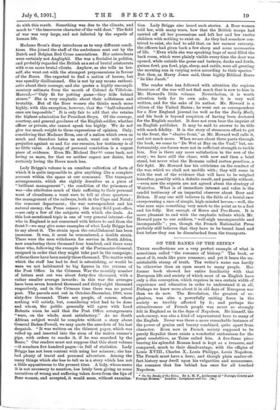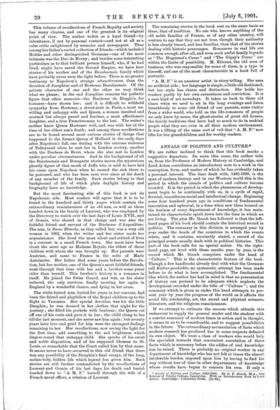ON THE BANKS OF THE SEINE.* THESE recollections are a
very perfect example of what is sometimes called "the romance of history." The book, or most of it, reads like pure romance; and yet it bears the un- mistakable stamp of truth. The writer's name can hardly be otherwise than an open secret to many people. Her former book showed her entire familiarity with that European life and society of which most of us English have only a dim conception, which requires in us a certain width of experience and education in order to understand it at all, Perhaps we knew more about it in old days of European war than we do now. The Revolution, the greatest of ex- plosives, was also a powerfully uniting force in the society so terribly affected by it; and perhaps the attractiveness of French people was never so strongly felt in England as in the days of Napoleon. He himself, the arch-enemy, was also a kind of supernatural hero to many of the English. Never was there a more remarkable instance of the power of genius and beauty combined, quite apart from character. Even now in French society supposed to be purely Royalist there exists a wonderful enthusiasm for the great condottiere, as Taine called him. A five-franc piece bearing his splendid Roman head is kept as a treasure, and compared, much to their disadvantage, with the effigies of Louis XVIII., Charles X., Louis Philippe, Louis Napoleon. The French must have a hero; and though plain matter-Of- fact history may dwell upon his vulgarities and meannesses, the romance that lies behind has once for all touched Napoleon.
• On the Banka of the Seine, By A. Di F. Authoress of " Foreign Courts and Foreign Homes." London : Longman' and Co. ids.]
This volume of recollections of French Royalty and society has many charms, and one of the greatest is its original point of view. The author writes as a loyal friend—by inheritance, if not by personal contact—and not at all as a calm critic enlightened by memoirs and newspapers. Thus among her father's varied collection of friends—which included Moltke and other distinguished Germans—one of the most intimate was the Due de Moray; and besides some interesting particulars as to that brilliant person himself, who, if he had lived, might have saved the Second Empire, we have here stories of his mother and of the Beauharnais family which have probably never seen the light before. There is no greater testimony to Napoleon's strange attractiveness than the devotion of Josephine and of Hortense Beauharnais. Of the private character of one and the other we may think what we please ; in the end Josephine remains the pathetic figure that other memoirs—the Duchesse de Reggio's, for instance—have shown her ; and it is difficult to withhold sympathy from Hortense, a street-arab in Paris, a most un- willing and unhappy wife and Queen, a woman insulted and scorned but always proud and fearless, a most affectionate daughter, and a true Frenchwoman to the last. The writer's mother knew Queen Hortense well, and was with her at the time of her eldest son's death ; and among these recollections are to be found several most curious stories of things that happened to the former Queen of Holland in the early days after Napoleon's fall, one dealing with the extreme rudeness of Talleyrand when he met her in London society, another with the Duchess de Berri, whom she also met in London under peculiar circumstances. And in the background of all the Beauharnais and Bonaparte stories moves the mysterious ghostly figure of that monk of Jaffa who is said to have laid his curse upon Napoleon when he caused the sick there to be poisoned, and who has been seen ever since at the death of any member of the family. Such stories belong to that background of life of which plain daylight history and biography have no knowledge.
But the most fascinating side of this book is not its Napoleonic side. Most readers will agree that it is to be found in the hundred and thirty pages which contain the extraordinary reminiscences of an old nun, as well as those handed down in the family of Laurent, who was employed by the Directory to watch over the last days of Louis XVII., and of Gomin, who shared in that charge and was also the faithful friend and servant of the Duchesse d'Augouleme. The nun, la Dame Blanche, as they called her, was a very old woman in 1862, when the writer and her sister made her acquaintance. She lived the most silent and retired of lives in a convent in a small French town. She must have been shout the same age as Madame Royale, the eldest of those children with whom she was brought up. Her parents were Austrian, and came to France in the suite of Marie Antoinette. Her father died some years before the Revolu- tion, but her mother, one of the Queen's most faithful friends, went through that time with her and a brother some years older than herself. This brother's history is a romance in itself. He joined the Swiss Guard, and was, as his sister believed, the only survivor, finally meeting her again in England by a wonderful chance, and dying in her arms.
The white-haired nun, buried for years in her convent, had been the friend and playfellow of the Royal children up to the flight to Varennes. Her special devotion was for the little Dauphin; he was dressed in her clothes that night for the journey ; she filled his pockets with bonbons ; the Queen cut off one of his curls and gave it to her ; the child clung to her till the last moment, and she never saw him again ; but seventy years later love and grief for him were the strongest feelings remaining to her. Her recollections, now seeing the light for the first time, add something to the sad brightness which lingers round that unhappy child. She speaks of his sweet and noble disposition, and of his supposed likeness to St. Louis, so remarkable that the Court called him by that name. It seems never to have occurred to this old friend that there was any possibility of the Dauphin's final escape, of the long, melancholy, hidden life which legend has given him. Such stories are still further contradicted by the recollections of Laurent and Gomin of his last days, his death and burial, handed down to "A. M. F." herself through the wife of a French naval officer, a relation of Laurent.
The remaining stories in the book rest on the same basis as these, that of tradition. No one who knows anything of the old noble families of France, or of any other country, will venture to say that they are not true, though their authority is less clearly traced, and less familiar, than that of the stories dealing with historic personages. Romances in real life are common enough, after all, and even such awful family legends as " The Huguenot's Curse " and " The Gipsy's Curse " are within the limits of possibility. M. Etienne, the old man of business, who was responsible for some of them, is a type in himself, and one of the most characteristic in a book full of portraits.
" A. M. F." is an amateur artist in story-telling. She uses no artificial aids ; her language is simple, a little old-fashioned, but her style has charm and distinction. She holds her readers partly by her own earnestness and conviction. It is a rare kind of art nowadays. It takes us back to those old times when we used to sit in the long evenings and listen breathlessly to some old friend of our parents, some visitor from a wider world, who told us the life-romances of people we only knew by name, the ghost-stories of great old houses, the family traditions that have had so much to do in making people what they are, even in all their modern environment. It was a lifting of the same sort of veil that " A. M. F." now lifts for her grandchildren and for worthy readers.



















































 Previous page
Previous page